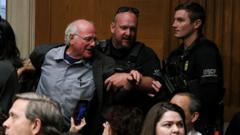Ben Cohen, co-founder of the iconic ice cream brand Ben & Jerry's, found himself on the wrong side of the law during a protest at a US Senate hearing on Wednesday, voicing his concerns regarding military aid to Israel and the dire humanitarian conditions in Gaza. The protest erupted as Health and Human Services Secretary Robert F. Kennedy Jr. was giving testimony, leading to a disruption that saw Cohen and others arrested.
According to US Capitol Police, Cohen faces a misdemeanour charge of crowding, obstructing, or incommoding, a typical charge associated with civil disobedience events in the nation's capital. Alongside him, six other protesters were also detained, facing more severe counts, including assaulting a police officer or resisting arrest.
Footage circulating on social media captured Cohen being led away by law enforcement with his hands bound, demonstrating his commitment to the cause. Following the incident, he expressed his motivations: "Congress kills poor kids in Gaza by buying bombs, and pays for it by kicking kids off Medicaid in the US."
Ben & Jerry's, known for its robust social and political activism since its inception in 1978 by Cohen and Jerry Greenfield, has supported various causes including LGBTQ+ rights and environmental issues. After being acquired by Unilever in 2000, the company has retained an independent board aimed at preserving its mission and values. However, relations between the two entities have soured, particularly after Ben & Jerry's announced in 2021 its decision to cease sales in the West Bank, which has led to a complicated legal battle.
Commenting on Cohen's actions, a Unilever spokesperson clarified that while Cohen's individual activism is commendable, it does not represent the positions of Ben & Jerry's or Unilever as a corporate entity. The ongoing dispute escalated when Cohen denounced the discharge of CEO David Stever over disagreements related to political initiatives, a situation Unilever dismissed, calling it an issue of employee confidentiality.
As the company continues to advocate for a ceasefire in Gaza, the intersection of activism and business remains a contentious topic, exemplified by Cohen's bold protest at the heart of American governance.



















